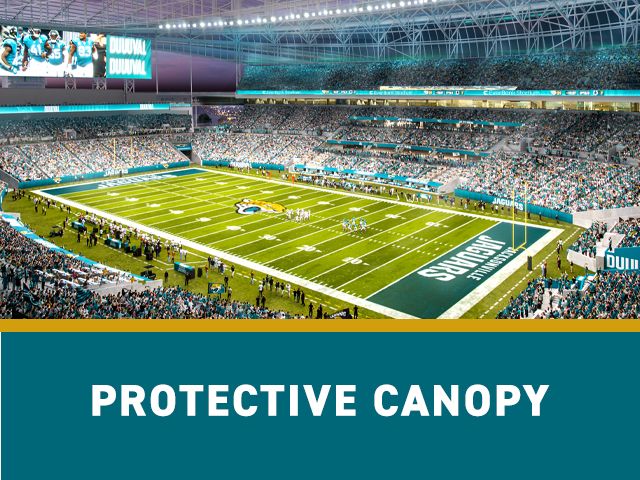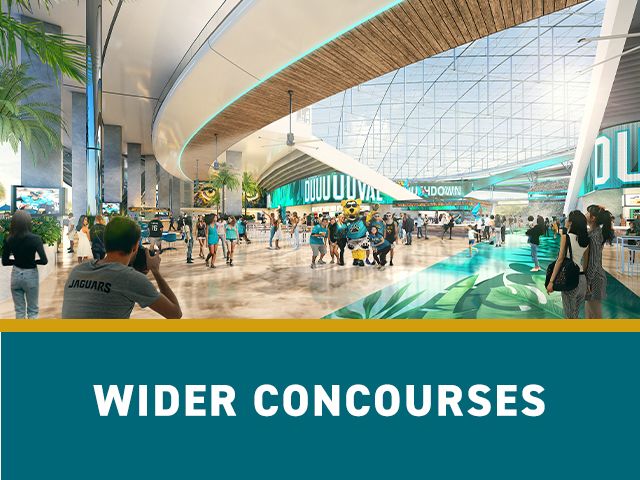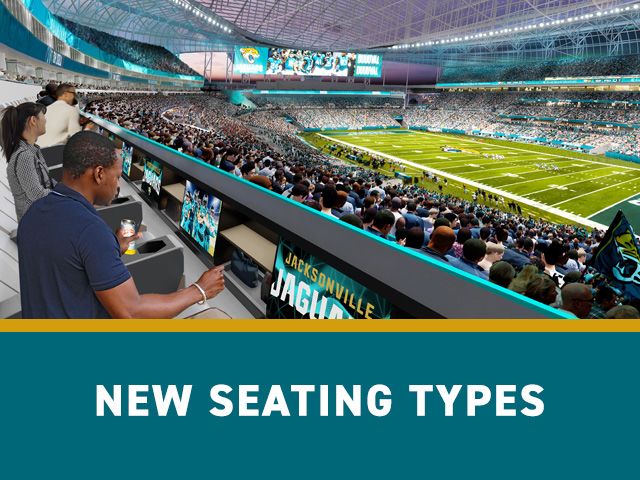Jacksonville Jaguars: Official Website of the AFC South NFL Team
Key Features
Proposed Timeline and Next Steps
General FAQs
Who owns EverBank Stadium?
The city of Jacksonville owns the stadium and its parking lots and, under the existing lease, is responsible for the maintenance, capital improvements and, ultimately, replacement of the stadium. The city has an agreement with ASM Global to manage and maintain the facility on its behalf. The Jacksonville Jaguars are one of several tenants of EverBank Stadium, contracted into a lease agreement to play NFL games and to host other events in the facility.
Why does Jacksonville need a new stadium?
Built in 1995, EverBank Stadium is experiencing significant mechanical, electrical and plumbing system challenges that have contributed to the facility reaching the end of its useful life. Due to an annual funding shortfall, there has been a substantial amount of deferred maintenance over the years that has led to failures and degradation of these systems.
As the 2024 EverBank Stadium Failures Report outlines, there are concerns with the aging stadium, including disruptions to service for ADA compliance, lack of available replacement materials due to age, and safety hazards, among other challenges. Additionally, there are health and safety considerations for our fans, players, coaches and staff to consider, including heat-related incidents during the summer/early fall months, overcrowding of pedestrian traffic in narrow concourses, and falling ceiling tiles due to consistent water damage.
Why is the stadium lease not being extended at this time?
The Jaguars' current stadium lease with the city of Jacksonville runs through the 2029 NFL season. Determining the future of the city-owned stadium is a crucial first step to a long-term lease extension.
The city, Jaguars and other local stakeholders executed an extensive study to identify a Stadium of the Future solution that will support NFL football in Northeast Florida for generations to come. The results enabled us to conclude that a substantial renovation of EverBank Stadium, rather than construction of a new stadium, is possible and the preferred path to the Stadium of the Future due to cost savings and reduction in consumption of natural resources.
This planning process involved many people along the way, including our many friends and neighbors who attended the community huddles we held throughout Jacksonville in 2021 and will continue to offer in the future. We're optimistic that a stadium solution can be reached that will benefit all stakeholders, including Jaguars fans and all guests who attend sports and entertainment events.
While we continue to work toward a long-term stadium solution, Shad Khan has elevated his enduring commitment to Jacksonville and building a winning tradition with the Jaguars by agreeing to a long-term lease for Miller Electric Center in downtown Jacksonville through at least the 2053 season. In addition, Shad made a personal financial contribution of $60 million toward construction, taking responsibility for all operating and maintenance expenses for the performance facility, which is a critical first step in the planning process toward the Stadium of the Future. This, combined with his investment in the Shipyards project – which exceeds $300 million - Shad's commitment to the community, its residents, the team and our fans, is clear.
Why aren’t the Jaguars paying 100 percent of the cost for the stadium?
While the city of Jacksonville owns EverBank Stadium and is responsible for maintenance, capital improvements and, ultimately, replacement of the stadium, the Jaguars recognize that a project of this magnitude should include an unprecedented level of private investment from one of its primary tenants. In this case, the city has a partner that is willing to match its investment, and in doing so, positively impact downtown Jacksonville's skyline and outlook for the future.
The Jaguars' private investment into this project will be recommended by the mayor's team and forwarded to City Council for their consideration.
If the Stadium of the Future goes over budget, who will pay for cost overruns?
The Jaguars will be responsible for any cost overruns for the new stadium, just as they have all other joint capital projects, including the Miller Electric Center, Daily's Place, Flex Field and others.
Other than the Jaguars, who will benefit from using a new stadium?
In addition to the weekly home games played annually by the Jaguars in Jacksonville, the city-owned EverBank Stadium also hosts the Florida vs. Georgia Football classic, TaxSlayer Gator Bowl, international sporting events, Monster Truck Jams, concerts, and non-profit, civic and corporate events, among others.
What is the anticipated economic impact of the Stadium of the Future?
The development of the new stadium is expected to generate significant one-time and long-term economic impact.
The one-time capital expenditure direct spending impact of $1.4 billion is expected to generate an estimated total economic impact of $2.4 billion for the Jacksonville economy. This impact will support 17,760 full- and part-time jobs and generate an estimated $70.7 million in state and local taxes.
Combining all impacts over the course of a 30-year period (through 2057), the stadium is expected to create a $26 billion total economic impact with $12.4 billion in direct spending, a majority of which would come from the Jaguars and stadium operations, as well as visitor and operator spending.
For more information on economic impact, download the Economic Impact Analysis for Jacksonville EverBank Stadium of the Future report (August 2023).
How can locally owned businesses and residents get involved in the projects?
The Jaguars are committed to providing local businesses with the opportunity to work on the Stadium of the Future, to best keep the investment in our community. As we have done for the Shipyards and Miller Electric Center, the Jaguars are engaged with the Jacksonville Small & Emerging Business (JSEB) division of the City of Jacksonville to identify certified local companies to bid on services for this project.
What will stadium capacity be?
The new stadium will have a base capacity of more than 63,000, with the ability to expand up to 71,500. The stadium is designed to support NFL and non-NFL events, including the Florida-Georgia football game, the TaxSlayer Gator Bowl, international sporting events and mega concerts.
What is the proposed timetable?
The construction schedule allows the team to play with limited capacity in the 2026 season and displace the team for only the 2027 season.
Why can’t the Jaguars play in EverBank Stadium during construction?
The Jaguars believe the stadium transformation should proceed in the most efficient, least disruptive and least expensive manner. A one-year displacement is the recommended approach, as the four-year "start and stop" renovation in between seasons would increase total costs by upwards of $190 million.
While the stadium is under construction, where will the Jaguars play?
With regards to a potential relocation of the team during the construction, the ideal location would be an NFL-ready football stadium or a temporary alternative near Jacksonville. The sites that best provide facility needs and support during the proposed construction period are Ben Hill Griffin Stadium in Gainesville and Camping World Stadium in Orlando. A decision on a temporary relocation site will be made in the coming months, pending an approved deal with the city of Jacksonville.
Season Ticket Members & Ticketing FAQs
What about season ticket member priority during a potential relocation?
Season ticket seniority will be frozen at the conclusion of the 2025 season. Season Ticket Members will have the option, but will not be required, to purchase season tickets during the limited capacity season in 2026 and in the temporary relocation season in 2027.
What is the new stadium season ticket relocation process?
Season ticket members may be offered a similar seating location in the new stadium. Should that seat no longer exist in the new infrastructure, the season ticket member may be offered the most comparable location available.
Season ticket members who wish to consider a different seat location in the new stadium will be given the opportunity to choose – based on seniority -- from available seating inventory not already held by season ticket members.
Elements of Proposed Stadium
What are the proposed changes to the stadium that fans can expect?
The city-owned stadium will have new elements to elevate the fan experience, including fan safety and comfort:
- The canopy structure will provide a protective shell made from ViewScape, a composite polymer that is the next generation of enclosure technology. This material provides greater transparency than traditional ETFE (a material widely used in existing stadiums), and the shell is contoured to maximize passive cooling ventilation from prevailing winds.
- The canopy will be supported by an entirely new column line surrounding the existing stadium structure. This independent structural system will reduce overall structural loads and the effects of sun, heat, wind and rain on the existing stadium bowl.
The new stadium will be a major transformation while using as much of the existing structure as appropriate, providing a more environmentally friendly, cost-effective and responsible approach.
- The most sustainable strategy is to adapt as much of the existing structure as appropriate, effectively reducing resource usage and minimizing the carbon footprint of new construction.
- The newly landscaped stadium grounds minimize the heat island effect, and native plantings reduce stormwater runoff volume and improve water quality by replicating the natural hydrology and water balance of the site. Additionally, the stadium grounds will double as a public park, which will enhance community health and well-being year-round.
- The stadium's exterior is designed to minimize utility needs and cost, providing passive cooling, shading, and natural ventilation for fans, athletes and performers.
- Stadium equipment and fixtures will be upgraded to improve energy performance and reach decarbonization goals.
The new stadium will feature dynamic and immersive technology to enhance the fan experience and connectivity to the game or event. The stadium will feature more than double the amount of vertical transportation and expanded concourses with 360-degree circulation providing a safer and more convenient flow for guests.
Will the video boards and spas be a part of the new stadium design?
Yes, both video boards and spas will remain a part of the fan experience in the reimagined stadium.
How will city-owned parking lots and private lots surrounding the stadium be affected?
It is anticipated that existing parking lots will be impacted before and after the construction of the new facility. In addition to existing lots that will be impacted by the nearby Jacksonville Armada facility, portions of the parking lots west of the stadium used for events, including Jaguars games, will also be affected.
The Jaguars and the city of Jacksonville will implement a multi-faceted plan to help offset the impact on surface parking. The plan consists of the following elements:
- Looking for opportunities to create new parking spaces within the new development. This will be focused on structured parking integrated into the development.
- Continuing to work with JTA to have a robust public transportation plan featuring the planned downtown automated urban transportation connector and expanding the regional shuttle bus program.
- Significantly improving the infrastructure necessary to support ride sharing offerings.
- Creating a local shuttle program to make it easier for fans to get from remote surface lots to the stadium.
The Jaguars have engaged a parking consultant and will be sharing a detailed parking report with our customers once we have a final agreement with the city.
Will there be any changes to the food service plan in the new stadium?
The improved revenue and food service infrastructure will enable the Jaguars to rollout a modern stadium food service plan headlined by local food providers who will offer their specialties at the same price they charge at their location(s) outside the stadium.
Commitment to Surrounding Communities
What impact will this have on the OUTEAST neighborhood?
The Jaguars are an active contributor to the work being done in the neighboring OUTEAST area, and support the efforts of the Historic Eastside Community Development Corporation and LIFT JAX in the neighborhood. In May 2021, The Khan Family and Jaguars Foundation donated $1 million to the LIFT JAX initiative for neighborhood revitalization.
The Jaguars expect the Stadium of the Future to provide significant benefits to the OUTEAST neighborhood, especially as it relates to jobs and resources. Any future development in this neighborhood should reflect the needs and desires of the residents. If the OUTEAST residents choose to invite the Jaguars to be a part of their Neighborhood Development Program, we will give it every consideration.
What is the commitment to community connections and health?
Jacksonville has great potential to be an exceedingly walkable city, but neighborhood connections need to be improved and/or prioritized. A key part of this project is to not only enhance the east/west connectivity between the Sports Complex and downtown but also the north/south connection from the St. Johns River through the Sports Complex to the OUTEAST neighborhood and beyond. Improving the connector between neighborhoods will not only open up our many historical neighborhoods, but also lead to better long-term health and community connectivity.












